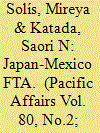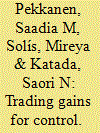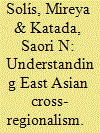|
|
|
Sort Order |
|
|
|
Items / Page
|
|
|
|
|
|
|
| Srl | Item |
| 1 |
ID:
155096


|
|
|
|
|
| Summary/Abstract |
Of the recent transformations in the political economy of the Asia-Pacific, one of the most dramatic has been to the region's trade architecture. For many years, Asian government were committed trade multilateralists: pursuing liberalisation either globally through the GATT, or regionally via APEC's model of open regionalism. Underpinned by US and Japanese leadership, this system provided the foundation for the export-driven Asian economic miracle. But since the early twenty-first century, the system has been rapidly transformed. The proliferation of preferential trade agreements has threatened to undermine the cohesiveness of regional trade arrangements. The emergence of WTO-Plus style liberalisation, emphasising services, investment and intellectual property, marks the maturation of a system previously focussed on tariff reduction and manufacturing exports. Since 2011, competition between two ‘mega-regional’ proposals – the Trans-Pacific Partnership and the Regional Comprehensive Economic Partnership – is also indicative of new splits which cut across traditional developmental divides. Growing geopolitical rivalry between the US and China has also raised question of who will lead the next round of liberalisation in the region. Exploring these new trends, this paper argues the trade architecture of the Asia-Pacific is entering is becoming more contested and fragmented, with major implications for economic regionalism in coming years.
|
|
|
|
|
|
|
|
|
|
|
|
|
|
|
|
| 2 |
ID:
078847


|
|
|
|
|
| Publication |
2007.
|
| Summary/Abstract |
By most accounts, Japan and Mexico remain distant economic partners with only a modest volume of bilateral trade and foreign direct investment, and a large geographical and cultural gulf between them. By this depiction, the Japanese decision to negotiate with Mexico is puzzling if not downright nonsensical: Why would Japan invest so much political capital in the negotiation of a complex free trade agreement (FTA) with a nation accounting for such a minuscule share of its international economic exchange? Solís and Katada challenge this interpretation of Japan's second bilateral FTA ever, and demonstrate that far from being irrational or insignificant, the stakes involved in the Japan-Mexico FTA were very high, and that this cross-regional initiative stands to exert powerful influence over the future evolution of Japan's shift towards economic regionalism. For a number of Japanese industries (automobiles, electronics and government procurement contractors) negotiating with Mexico was essential to level the playing field vis-à-vis their American and European rivals, which already enjoyed preferential access to the Mexican market based on their FTAs. For the Japanese trade bureaucrats, negotiations with Mexico offered an opportunity to tip the domestic balance in favour of an active FTA diplomacy, despite the opposition of the agricultural lobby. Negotiations with Mexico constituted a litmus test, both for the Japanese government and in the eyes of potential FTA partners in Asia, on whether Japan could offer a satisfactory liberalization package to prospective FTA partners to make these negotiations worthwhile
|
|
|
|
|
|
|
|
|
|
|
|
|
|
|
|
| 3 |
ID:
079954


|
|
|
|
|
| Publication |
2007.
|
| Summary/Abstract |
The explosive proliferation of trade forums poses fundamental questions about why states forum-shop as they pursue liberalization. We advance a novel argument linking the institutional design of international trade forums directly to domestic politics. If industrialized democratic states have to appease conflicting forces in the domestic political marketplace as economic liberalization proceeds apace, they should prioritize forums that allow them to exert greater control over the pace and scope of liberalization. This prioritization is influenced by a tradeoff between two critical dimensions that combine differently across all international trade forums: the gains dimension, which determines the extent to which states can increase economic welfare based on the forum's rules; and the control dimension, which determines the extent to which they have power to set the forum's rules in line with their political concerns. We use the case of Japan to demonstrate the importance of the gains-control tradeoff.
|
|
|
|
|
|
|
|
|
|
|
|
|
|
|
|
| 4 |
ID:
175226


|
|
|
| 5 |
ID:
078845


|
|
|
|
|
| Publication |
2007.
|
| Summary/Abstract |
A key feature of East Asian FTA diplomacy remains unacknowledged and, therefore, unaccounted for: the activism displayed in seeking preferential trading relations with countries outside the region. While European and North American countries have also pursued cross-regional trade agreements (CRTAs), East Asia is unique in pursuing extra-regional partnerships before consolidating the regional trade integration process. This framework article identifies the common patterns and fundamental factors behind the East Asian governments' moves towards establishing CRTAs. After laying out the conventional arguments-ranging from the extra-regional market dependence, the region's security arrangements, and economic and political motives behind East Asia's extra-regional interests-the article introduces the novel concept of "leverage." This notion highlights how cross-regional and intra-regional FTA initiatives are intimately linked: East Asian countries frequently choose an extra-regional FTA partner in order to break regional inertias that hinder integration, to win domestic battles, and to appropriate extra-regional negotiation modalities that they can use in their subsequent intra-regional FTA negotiations. The article concludes with a summary of the findings from the country cases, and the policy implications of East Asia's porous regionalism, with its heavy doses of cross-regional trade initiatives.
|
|
|
|
|
|
|
|
|
|
|
|
|
|
|
|
|
|
|
|
|